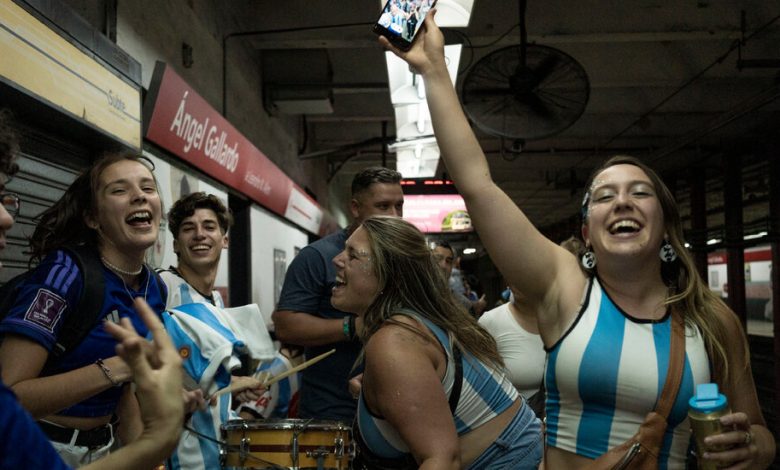Argentina Hits the Streets for Long-Awaited Celebration





Argentina erupted in celebration after the country’s World Cup victory over France.Credit…Anita Pouchard Serra for The New York Times
BUENOS AIRES — After 36 years, the parade couldn’t wait.
Half a world away, Argentina’s beloved men’s national team hoisted its third World Cup trophy. And the nation began to march.
In a sort of euphoric procession that played out across the country, millions of Argentines paraded to central squares and monuments in cities and towns, large and small. In Rosario, the hometown of their World Cup hero, Lionel Messi, they marched to the Flag Monument. And here in the capital, Buenos Aires, fans streamed down broad avenues that all pointed to the city’s effective center — a large plaza centered around a 235-foot-tall monument known simply as the Obelisk.
“It is our pilgrimage,” said Elsa Diaz, 70, a handywoman draped in an Argentine flag, making the same walk she made in 1978 when Argentina won its first World Cup, but this time with her 32-year-old daughter. “We are all going to the Obelisk. It is our monument, and the center of Argentina.”
In a country where soccer is religion, this was among the holiest of Sundays. And so when Gonzalo Montiel’s penalty kick hit the back of the net — vanquishing France, ending a World Cup final for the ages and bringing the championship back to this soccer-obsessed country for the first time since 1986 — Argentina was plunged into a sort of rapture.
Strangers hugged. Friends kissed. Grown men wept. And everyone shrieked. “Argentina, mi amor!” one man yelled during extra time, tears streaming down his face. “Argentina, my love!”
“Emotion, joy — and a release,” said Federico Polo, 19, right after the victory.

Argentines celebrated the country’s first World Cup title in 36 years.Credit…Anita Pouchard Serra for The New York Times
Thousands had gathered in Centenario Park in western Buenos Aires to watch the game on a large screen set up by the city. After the match, everyone had the same idea: Head to the Obelisk.
But the roads were jammed, the metro was shut down and the city buses were parked. So they walked.
“The entirety of Argentina is on this avenue right now,” said Sergio Gutierrez, 46, a drugstore worker banging a drum, who walked with his wife and three children down Corrientes Avenue, a famed thoroughfare closely associated with the tango for the many theaters and dance halls that line the way. “We will walk until we can’t get any farther.”
The walk from the park would take 70 minutes, according to Google Maps, but the avenue was jammed, the pace was slow, and there were plenty of distractions along the way.
Every woman who looked to be of grandmother age was serenaded with a chant that has become a rallying cry of this year’s World Cup in Argentina: “Abuela, la, la, la, la, la.” The chant, of the Spanish word for grandmother, began in Buenos Aires after one of Argentina’s victories, when a group of young men sang it to a dancing older woman who wore a medical mask and wrapped herself in a flag.
“She still doesn’t know why everyone is singing to her but she loves it,” said Silvia Belvedere of her 89-year-old mother, Nelida Peralta, who was standing on the sidewalk along the procession, gripping a cane and waving two small Argentina flags. As the procession passed, each group that noticed her stopped to serenade her and take photos.
“I’m so happy,” Ms. Peralta said. “I can’t go there, so I’m staying here waving the flag.”
Farther down the avenue, a group of Bangladeshi immigrants were greeted warmly by the marching fans. Bangladesh’s love for Argentina’s national soccer team has become a major storyline here, and so Argentines parading down the route stopped for photos and high fives. One of the men from Bangladesh, who said he had lived in Buenos Aires for 24 years, said he had never felt more connected to his adopted home.
Along the route, Argentines expressed their joy with whatever was at hand. Cars stuck at intersections watching the procession beeped incessantly; one man banged a pan with a spoon. And over and over again, the crowd sang this year’s anthem of the Argentina national team, “Muchachos, Ahora Nos Volvimos A Ilusionar” — or “Guys, Now We’re Getting Excited Again.”
The song has become a sort of celebratory hymn in Argentina over the past several weeks, and it speaks of Argentina’s late soccer star, Diego Maradona, a sort of deity in this country, looking down from the sky to help Messi and his teammates bring Argentina another World Cup. After the song’s prediction came to fruition on Sunday, it was the soundtrack of the march.
As the Obelisk came into view, the crowd thickened. A city bus that had been abandoned in the middle of the street had more than a dozen revelers dancing atop it. Elsewhere, men hung from light poles, and people climbed to the roof of a restaurant via a ladder that created a sort of bridge between the restaurant and the top of a newsstand.
Some people had already been to the Obelisk and were heading the other way, their pilgrimage complete. A man with his face and chest painted blue and white looked drained. “My throat hurts from screaming,” said Pedro Humberto Aguilar, 51, behind blue-tinted shades.
The procession ended at Republic Plaza, a sea of celebration in every direction. Every avenue leading to the plaza was clogged with revelers. From above, the plaza was an expanse of humanity, hundreds of thousands of people, interspersed with waving flags and occasional fireworks.
Through the rapturous cacophony, the anthem could be made out here and there.
Over and over again, revelers belted out the lyrics, which try to convey Argentina’s intense love for its soccer team.
“I can’t explain it to you,” they sang, “because you won’t understand.”
Macarena Funes and Valeria Dorrego contributed reporting.




